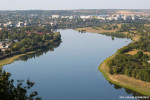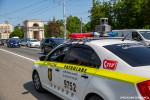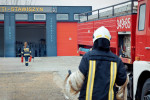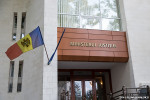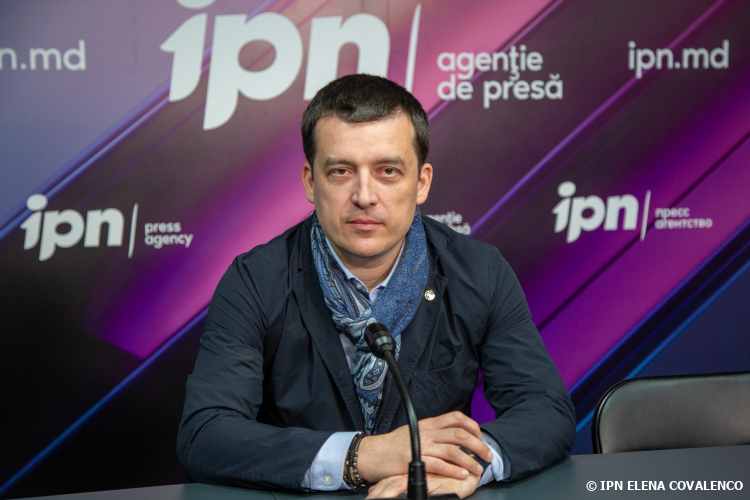
“Queen Maria never left Moldova,” says Romanian Foreign Ministry State Secretary Andrei Novac in an interview for IPN, in which he discusses symbols, culture, and education. From joint Moldovan-Romanian literary initiatives to the idea of a film co-production and the importance of continuity in cultural projects, Novac outlines a clear and pragmatic vision. Read an honest dialogue about identity, responsibility, and the need for concrete actions beyond festive speeches.
IPN: Mr. Novac, how do you feel in Chișinău?
Andrei Novac: Every time I come here, I feel very good in Chișinău. I have tried to be present here every year on March 27 for the events held in this city. This time, an especially important event took place — the unveiling of the statue of Queen Marie.
IPN: Within Romania’s Ministry of Foreign Affairs, you are responsible for education, culture, and sports. What are the ministry’s priorities in strengthening cooperation between Romania and the Republic of Moldova?
“Queen Marie never left this land”
Andrei Novac: There are many priorities, some of which are ongoing. I’ve had multiple discussions here at the Ministry with various state secretaries — some of whom have since become ambassadors of the Republic of Moldova. I believe one of the most important goals is aligning public and cultural policies between Romania and Moldova. The Romanian Cultural Institute has foreign branches — a tool that can and should also be used in relation to the Republic of Moldova.
We are talking about two spaces that share a common cultural past, present, and future. I emphasized this even during my time as director of the National Book Center. Romania's programs that support the translation of literature abroad — not only fiction, but also specialized works — have always been open to all Romanian-language writers, regardless of their citizenship or whether they live within or outside Romania’s current borders.
This area is essential for any state's diplomacy and, of course, important for us as well. I’m glad there’s practical coordination between our cultural programs abroad and the activity of Moldova’s cultural attachés. I’ve witnessed this cooperation at the events I’ve attended — and it truly made me happy. After all, if we are celebrating Eminescu, Rebreanu, or Nichita Stănescu — we can do it together.
The unveiling of the statue of Queen Marie — the queen of Greater Romania in 1918 and also the queen of this region we find ourselves in — carried a special emotional weight. Someone asked me recently how I perceived this "return" of Queen Marie to Chișinău. I believe she never left. Symbols remain — they cannot be replaced or erased, no matter the difficulties a region goes through. And both our regions endured major hardships, especially during the communist era — in both Bucharest and Chișinău.
IPN: As we mentioned earlier, there are plans for tourism projects that promote the shared cultural identity. Historical monuments exist, but perhaps there should be more?
“Every cultural initiative must be based on a strong education system”
Andrei Novac: I believe these can be developed through a concrete program from the Ministry of Education — whether in Bucharest or Chișinău. It would be a great idea for both ministries to collaborate and organize themed trips as part of a joint educational policy. This way, students from both sides of the Prut River would have the chance to better understand our shared cultural spaces.
I repeat: every action related to culture and identity must have at its foundation a high-performing education system. Without a solid and coherent educational policy, these projects cannot be sustained. As in Chișinău, Romania also has disparities between urban and rural schools. That’s why we must offer all children — regardless of where they are born or live — a chance to succeed.
This chance must be supported through social policies. In Romania, schools are under local authorities, so in addition to educational policies, we also need well-thought-out social ones. And abroad, Romanian language lectorates are essential — for many reasons.
IPN: The government in Chișinău is making efforts to promote the Romanian language in regions where it is rarely spoken — for example, Gagauzia or Transnistria. How can Romania help in this regard?
Andrei Novac: This should primarily be a dialogue between the two Ministries of Education. Of course, the Ministry of Foreign Affairs can support these efforts from a diplomatic perspective.
It all starts with education. It's important that Romanian literature — including specialized subjects like history — reaches these children. Even Romanian literature translated into the languages spoken in those regions can play an important role. Any form of cultural and educational information is extremely valuable.
We live in a society of constant communication, but unfortunately, we talk a lot and convey little. Anyone can try a simple exercise: how many messages do we exchange to schedule a meeting, even when the place is already agreed upon? Forty years ago, a landline phone solved everything. Today, we have more tools, but perhaps less clarity.
At the Romanian Cultural Institute, promoting the Romanian language is a priority. That’s why we offer Romanian language courses in all areas where we have branches. This information must reach people — young and old alike. No distinctions should be made. Education is a continuous process — one that should never stop.
IPN: Continuing on this topic, Romania has supported the Republic of Moldova over the years through various book donations to schools and libraries. Still, there is a significant gap between institutions in rural or small towns and those in Chișinău. How do you assess the impact of these donations today, in terms of promoting Romanian culture, language, and shared values?
Andrei Novac: I see these donations as a state of normality, not something exceptional. Unfortunately, I know — even from my time at the National Book Center — that there are very few Romanian-language books in the villages around Chișinău. It’s a real problem, and I believe a solution must be found.
No matter how good past initiatives were or their social or media impact, they must continue. Books need to circulate — that is an essential attribute of the book. I say this also from my perspective as a writer.
The Book Fair is still being organized — an event I coordinated for years at the Romanian Cultural Institute. I believe it should be intensified, and perhaps we should rethink how it can become more present in people's daily lives. I always hoped this fair would be held right here, between the Government and the Metropolitan Cathedral — in a public space accessible to all. A great example is the Book Fair in Retiro Park, Spain, where for two weeks books are sold from temporary pavilions in a relaxed setting alongside lectures, concerts, and film screenings. People come, stroll, buy books, and attend cultural events — it’s a very successful formula.
IPN: Is such an initiative difficult to implement in Bucharest?
Andrei Novac: It might seem difficult, but it’s not impossible. It’s an issue tied to local administration — the General City Hall or the sector halls. However, I was referring to the book fair Romania supports each year here in Chișinău. I think the university venue is now much more welcoming than the old exhibition center, which was quite far and hard to reach. I was often told, “We can’t easily get there, there’s no public transport” — and that’s true.
Bringing the fair closer to people, especially children, is essential. We need to get them used to the atmosphere of books. If we complain that people no longer read, we must do something to attract them to reading. Even the habit of reading on the bus or subway has disappeared. Now everyone has phones, tablets — but they’ve distanced themselves from the book as an object.
IPN: Technological progress seems to have its downside...
Andrei Novac: Indeed. There’s no progress without side effects. From my point of view, the physical book must remain present in our lives. Direct communication, human contact — these are essential. We live too much in the world of messages and forget to meet, to speak, to understand. Even language has changed — I sometimes realize I no longer understand online abbreviations. But this modern communication should not exclude the classical one, which remains the most effective.
IPN: For health and education alike, direct contact is still crucial.
Andrei Novac: Exactly. In both medicine and education, direct communication is most efficient. We went through the pandemic, experienced online classes, and felt how difficult it is to create a real connection through a screen. Younger generations adapted more easily, but for many of us, it was hard. Communication without feedback isn’t communication — it’s just a monologue.
IPN: A large number of students from the Republic of Moldova choose to study in Romania. Are there plans to expand scholarship programs and academic exchanges?
Andrei Novac: These matters are managed by the Ministry of Education, but from my point of view — yes, scholarships should be extended. I have always supported the idea that research scholarships in international institutes should be increased to align more closely with European or American levels.
I had the opportunity to meet many engaged and organized Moldovan students — for example, in Timișoara, where I studied, they had a very active presence in university life. They must be encouraged — and supported to return to Chișinău after completing their studies. It is important that young people trained in Romania contribute to the development of society here.
IPN: In the context of parliamentary elections in Chișinău, what are Romania’s expectations?
“Continuity is the key”
Andrei Novac: I believe the main expectation is that citizens freely and democratically express their vote. The result — we’ll see after the elections.
IPN: Personally, what do you hope for in the cultural and educational field, post-election?
Andrei Novac: I hope we continue on our current path and move forward with the projects we’ve already started. It would be a serious setback if they were interrupted. Continuity is key — without it, everything becomes fragmented and complicated. I hope the current direction in our relationship with Chișinău remains unchanged.
“We talk a lot, we’re enthusiastic, but rarely take action”
IPN: What message do you have for Romanian citizens in the Republic of Moldova?
Andrei Novac: To defend the values that define them: language, religion, access to education in Romanian. These are things that must be treasured and protected. Do not give them up — because otherwise, you give up your identity. Romania will continue to stand by you in supporting these shared values.
IPN: There is still no joint film production between Romania and Moldova, although discussions about a common support fund are becoming more frequent. What’s your take on this?
Andrei Novac: It’s an excellent idea. But to put it into practice, we need to take concrete steps. We talk a lot, we’re enthusiastic — but rarely follow through. I promise that after this conversation, I’ll do what’s within my power to find a solution. And not only in film — there are many shared points in culture and sports where we can develop impactful projects.



